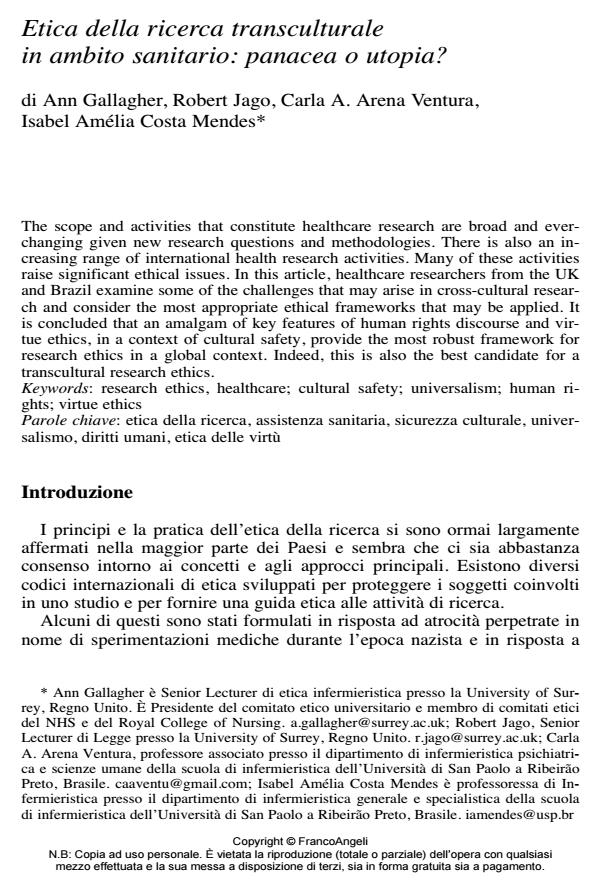Etica della ricerca transculturale in ambito sanitario: panacea o utopia?
Journal title SALUTE E SOCIETÀ
Author/s Ann Gallagher, Robert Jago, Ventura Carla A. Arena, Mendes Isabel Amélia Costa
Publishing Year 2013 Issue 2013/3 Language Italian
Pages 16 P. 67-82 File size 114 KB
DOI 10.3280/SES2013-003005
DOI is like a bar code for intellectual property: to have more infomation
click here
Below, you can see the article first page
If you want to buy this article in PDF format, you can do it, following the instructions to buy download credits

FrancoAngeli is member of Publishers International Linking Association, Inc (PILA), a not-for-profit association which run the CrossRef service enabling links to and from online scholarly content.
The scope and activities that constitute healthcare research are broad and everchanging given new research questions and methodologies. There is also an increasing range of international health research activities. Many of these activities raise significant ethical issues. In this article, healthcare researchers from the UK and Brazil examine some of the challenges that may arise in cross-cultural research and consider the most appropriate ethical frameworks that may be applied. It is concluded that an amalgam of key features of human rights discourse and virtue ethics, in a context of cultural safety, provide the most robust framework for research ethics in a global context. Indeed, this is also the best candidate for a transcultural research ethics.
Keywords: Research ethics, healthcare; cultural safety; universalism; human rights; virtue ethics
- Agency for Healthcare Quality and Research (2012). Setting the agenda for cultural competence in healthcare: introduction and key findings. Retrieved from: www.ahrq.gov/research/cultural.htm#Introduction (Accessed 02/09/12).
- Beisiegel U. (2010). Research integrity and publication ethics. Atherosclerosis, 212: 383-385, DOI: 10.1016/j.atherosclerosis.2010.01.050
- Biggs H. (2009). Healthcare research ethics and law: regulation, review and responsibility. London: Routledge Cavendish. Bosch X., Tituls S.L. (2009). Cultural challenges and international research integrity. The Lancet, 373: 610-612, DOI: 10.1016/S0140-6736(09)60379-2
- Dogan H., Tschudin V., Hot I., Ozkan I. (2009). Patients’ transcultural needs and carers’ ethical responses. Nursing Ethics, 16, 6: 683-696, DOI: 10.1177/0969733009341396
- European Science Foundation & All European Academies (2012). The European code of conduct for research integrity. Retrieved from: www.esf.org/index.php?eID=tx_nawsecuredl&u=0&file=fileadmin/be_user/CEO_Unit/MO_FORA/MOFORUM_ResearchIntegrity/Code_Conduct_ResearchIntegrity.pdf&t=1346790636&hash=51cf064769c439186f21308ae16449362e2c84a2 (Accessed 02/09/12).
- Gallagher A. (2010). The trouble with ‘transcultural nursing ethics’. Nursing
- Ethics, 17, 2: 155-156, DOI: 10.1177/0969733009357837
- Geller G., Boyce A., Ford D., Sugarman J. (2010). Beyond ‘Compliance’: the role of institutional culture in promoting research integrity. Academic Medicine, 85, 8: 1296-1302, DOI: 10.1097/ACM.0b013e3181e5f0e5
- Georgetown University National Center for Cultural Competence (2012). Conceptual frameworks/models, guiding values and principles. Retrieved from: www11.georgetown.edu/research/gucchd/nccc/foundations/frameworks.html (Accessed 02/09/12).
- Habbermann B., Pryor M., Ziner ER., Wagler K. (2010). Research coordinators’ experiences with scientific misconduct and research integrity. Nursing Research, 59, 1: 51-57, DOI: 10.1097/NNR.0b013e3181c3b9f2
- Hanssen I., Alpers LM. (2010). Utilitarian and common sense morality discussions in intercultural nursing practice. Nursing Ethics, 17, 2: 201-211, DOI: 10.1177/0969733009355544
- Higher Education Funding Council for England (2012). The concordat to support research integrity HEFCE. Retrieved from: www.universitiesuk.ac.uk/Publications/Pages/concordattosupportresearchintegrity.aspx (Accessed 02/09/12).
- Hudson R. (2008). Research ethics and integrity - the case for a holistic approach. Research Ethics Review, 4, 4: 131-140, DOI: 10.1177/174701610800400402
- International Conference on Harmonisation on Technical Requirements for Registration of Pharmaceuticals for Human Use (2012). Good clinical practice. Retrieved from: http://ichgcp.net (Accessed 02/09/12).
- INVOLVE (2012). User controlled research National Institute for Health Research. Retrieved from: www.invo.org.uk/find-out-more/user-controlledresearch (Accessed 02/09/12).
- Jackson M., MacCrimmon M. (1999). Research confidentiality and academic privilege: a legal opinion. Retrieved from: www.sfu.ca/~palys/JackMacOpinion.pdf (Accessed 02/09/12).
- Leininger M. (2002). Culture care theory: a major contribution to advance transcultural knowledge and practice. Columbus: McGraw-Hill College Custom Series.
- Lignou S. (2011). The ‘standard of care’ debate and global justice in research. Research Ethics, 7, 1: 5-12, DOI: 10.1177/174701611100700103
- Lowman J., Palys T. (2000). The research confidentiality controversy at Simon Fraser University. Retrieved from: www.sfu.ca/~palys/Controversy.htm.
- Macklin R. (1999). Against relativism: cultural diversity and the search for ethical universals in medicine. New York: Oxford University Press Ministry of Health Brazil (1996). National Health Council: Resolution 196 from 1996 on research involving human subjects.
- Ndebole P. (2011), Research ethics. In: Chadwick R., ten Have H., Meslin E.M., eds., The Sage handbook of health care ethics. London: Sage Publications: 306-325.
- Papadopoulos I. (2006). Transcultural health and social care development of culturally competent practitioners. Edinburgh: Churchill Livingstone/Elsevier.
- Plomer A. (2005). The Law and ethics of medical research: international bioethics and human rights. London: Cavendish.
- Poff D. (2010). Reflections on the relationship of research integrity to research ethics in publishing. Journal of Academic Ethics. 8: 259-263, DOI: 10.1007/s10805-010-9126-8
- Singapore Statement on Research Integrity (2010). Retrieved from: www.singaporestatement.org (Accessed 02/09/12).
- Steen G. (2010). Retractions in the scientific literature: is the incidence of research fraud increasing? Journal of Medical Ethics, 37, 4. Retrieved from: http://jme.bmj.com/content/early/2010/12/23/jme.2010.040923 (Accessed 02/09/12), DOI: 10.1136/jme.2010.040923
- Steen G. (2011). Retractions in the medical literature: how many patients are put at risk by flawed research? Journal of Medical Ethics, 37, 11: 688-692, DOI: 10.1136/jme.2011.043133
- UK Research Integrity Office (2009). Code of practice for research: promoting good practice and preventing misconduct. London: Ukrio.
- Woods M. (2010). Cultural safety and the socioethical nurse. Nursing Ethics, 17, 6: 715-725, DOI: 10.1177/0969733010379296
- Zimmer C. (2012). A sharp rise in retractions prompts calls for reform. New York Times. Retrieved from: www.nytimes.com/2012/04/17/science/rise-in-scientific-journal-retractions-prompts-calls-for reform.html?pagewanted=all (Accessed 02/09/12).
- Banks S., Gallagher A. (2009). Ethics in professional life: virtues for health and social care. Basingstoke: Palgrave MacMillan.
- Beauchamp T.L., Childress JF. (2009) Principles of biomedical ethics, 6th ed., New York: Oxford University Press
Ann Gallagher, Robert Jago, Ventura Carla A. Arena, Mendes Isabel Amélia Costa, Etica della ricerca transculturale in ambito sanitario: panacea o utopia? in "SALUTE E SOCIETÀ" 3/2013, pp 67-82, DOI: 10.3280/SES2013-003005